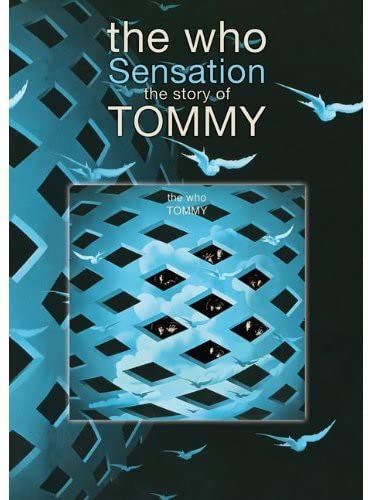
This year marks the 45th anniversary of The Who’s landmark rock opera Tommy, and the celebrations and accolades continue. In 2013, they released a deluxe box set featuring demos, early versions, and live renditions of Tommy tracks; now Eagle Rock has followed suit with Sensation: The Story of Tommy, a DVD/Blu-ray that provides an overview of the album’s creation. An expanded version of the 2013 BBC documentary, the release features new interviews with Pete Townshend and Roger Daltrey as well as archival footage of John Entwistle. Casual fans will enjoy the look back on a seminal work, although hardcore fans will find little new information here.
Not surprisingly, Townshend receives the most screen time, since Tommy was primarily his brainchild. He discusses how his turbulent childhood inspired several elements of Tommy’s story, particularly his fragile relationships with his mother and grandmother. For example, Townshend reasons that his unresolved feelings toward the two heavily influenced the angry sound of “Acid Queen” as well as its unflattering portrayal of a woman corrupting a child. Another important influence was the teachings of Meher Baba, an Indian spiritual master whose ideas intrigued the singer/songwriter. The guru’s themes of enlightenment inspired Townshend to abandon hallucinogenics and reexamine his rockstar life; those actions of self-reflection permeate songs such as “Smash the Mirror” and “I’m Free.”
Another interesting exploration is of Daltrey’s vital contributions to the rock opera. Although often at odds, Townshend and Daltrey praise each other for their artistry and individual roles in the project. At first, Townshend and co-producers/managers Kit Lambert and Chris Stamp expressed dissatisfaction with Daltrey’s voice on “See Me, Feel Me”; in fact, Townshend had decided to sing it himself. Just before he laid down his vocals, he heard Daltrey’s latest attempt; his fragile-sounding voice, Townshend decided, had finally encapsulated Tommy’s vulnerability. At that moment, he explained, Daltrey had fully embodied the title character.
Lambert often double-tracked the Who’s vocals, and watching Daltrey listen to his unadorned voice on “The Hawker” and “See Me, Feel Me” is a joy. Clearly the singer worked extremely hard on his performance, and his naked vocals demonstrate that fact.
Other anecdotes reveal just how driven Townshend was in creating Tommy. Until the album, the Who was seen primarily as a solid singles band. Then they released what Townshend felt was a masterpiece, “I Can See for Miles”; when it failed to top the charts, he decided the band needed to change direction. Afraid the band was losing its touch, Townshend aimed to create a work of art rather than just a collection of singles. He drew inspiration from sources other than his own life, such as a pinball-playing acquaintance of rock critic Nik Cohn as well as the album artwork illustrator Mike McInnerney (Townshend would even play him demos to gauge reactions).
Unfortunately, two areas receive little screen time: Entwistle’s compositions “Cousin Kevin” and “Fiddle About,” and Keith Moon’s role in the band. Townshend mentions that he asked Entwistle to write songs about the despicable characters Cousin Kevin and Uncle Ernie, as their backstories involved child abuse (a topic too close to Townshend, as he is an abuse survivor). Those songs dealt with uncomfortable and taboo themes, and still sound shocking today. Along with his incredible bass lines, those songs should have received more attention. Moon wrote the song “Tommy’s Holiday Camp” as both comic relief and as a crucial plot point, but little else is mentioned in Sensation. His drumming is also disappointingly overlooked in the documentary.
Despite its flaws, Sensation: The Story of Tommy provides a serviceable overview of an important piece of art and music. Longtime fans may be dismayed at the lack of new details, but more casual Who listeners will learn much more about Tommy’s underlying themes, symbolism, creation, and place in music history. As a bonus, the DVD/Blu-ray includes the September 27, 1969 episode of the German show Beat Club, which was dedicated to the Who. The band lip synchs to several Tommy numbers, alternated with snippets of Townshend explaining the heretofore unheard rock opera.